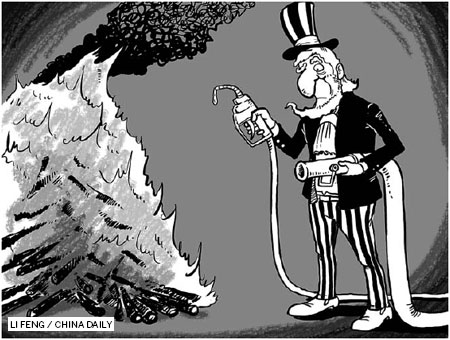What Panetta's visit means
- By Zhao Xiaozhuo
 0 Comment(s)
0 Comment(s) Print
Print E-mail China Daily, September 13, 2012
E-mail China Daily, September 13, 2012

US Defense Secretary Leon Panetta is scheduled to visit China later this month amid rising tensions between China and Japan over the sovereignty of the Diaoyu Islands and the ongoing US-Japan joint exercise purported to take over the islands. Also, China is getting increasingly worried over the United States' role in Beijing's territorial disputes with some of its neighbors, Washington's strategy for the Asia-Pacific region and the strategic distrust between the two countries' militaries. So what can be expected from Panetta's first visit to China as Pentagon chief?
Panetta's visit, in my personal opinion, will help China understand US strategic intentions. This year has seen a great change in Washington's military strategy. On Jan 5, the US Defense Department released a non-classified version of its strategic defense guideline, "Sustaining US Global Leadership: Priorities for 21st Century Defense", which announced the shift in US strategic focus from the Middle East to Asia-Pacific. Speaking at the Shangri-La Dialogue in Singapore on June 2, Panetta outlined details of the US plan for its "rebalance" toward Asia-Pacific, saying the US Navy will reposition 60 percent of its warships in Asia-Pacific by 2020 as part of its new military strategy.
When the dispute between China and the Philippines over the sovereignty of the Huangyan Islands in the South China Sea heated up in April, the US, then engaged in a joint military drill with the Philippines, supported Manila's aggressive attitude. Now when China is at odds with Japan over the Diaoyu Islands dispute, the US is holding controversial joint exercises with Japan in Tinian, Guam, and Saipan.
Conflicting signals sent by the US exacerbate China's suspicion about Washington's strategic intentions. Although high-ranking US officials have denied that Washington's actions are aimed at Beijing, the circle around China orchestrated by the US seems to be tightening.
Washington says it is not taking sides in the Diaoyu Islands dispute, but US Secretary of State Hillary Clinton has claimed that the islands fall within the scope of the US-Japan security treaty. And although the US says it has no intention of getting involved in the South China Sea disputes, it criticizes China for setting up a military garrison in the newly built Sansha city in Hainan province.
The conflicting signals from the US have left China confused, and Panetta needs to clear this confusion.
The Pentagon chief's visit to China, however, will help promote military-to-military strategic trust and reduce misunderstanding between the US and China. China and the US are significantly different in many aspects, including social systems, degrees of development, cultures and traditions, and international perceptions, which often leads to different interests in and different views on a broad range of important issues.
Over the past 20-odd years bilateral military relationship, the most fragile in Sino-US ties, has gone through ups and downs, and strategic talks have been suspended at least six times, mostly because of US arms sales to Taiwan. It demonstrates that Sino-US military ties lack an inherent driving force, for which mutual strategic distrust is to blame. This distrust has led to the on-and-off cycle in bilateral military ties. And frequent suspensions of military talks increase anxiety and lead to deeper distrust, turning the relationship into a vicious circle.
Given this backdrop, bilateral exchange is extremely important if the two countries want to promote understanding and reduce miscalculations, particularly at the higher-level leadership, because the American and Chinese approaches to military exchanges are diametrically opposite. While the US relies on a "bottom-up" approach, starting with lower-level contacts to work toward mutual understanding and then strategic agreement, China follows a "trickle-down" relationship in which an agreement on strategic issues results in understanding and then allows for specific activities later.
The US may believe that military trust is an outcome of frequent exchanges at different levels and the development of people-to-people understanding, thus putting greater emphasis on various kinds of exchanges. However, China thinks that political trust is a prerequisite for military trust, not vice versa. If there is no basic trust at the political level, how can military trust be established?
Recognizing the importance of higher-level exchanges, in the past two years, high-ranking military visits between the two powers have maintained a positive momentum. Defense Minister General Liang Guanglie visited Washington in May and Deputy Chief of General Staff Cai Yingting did so in August. In between, US Pacific commander Admiral Samuel Locklear visited Beijing in July.
Panetta's visit will be conducive to promoting China-US military cooperation. Since non-traditional security threats pose a real problem for China, the US and other countries, China and the US need to cooperate on the security front to counter them. They have to find more common grounds to deal with security challenges of a global nature such as international terrorism and proliferation of weapons of mass destruction. No country can tackle these problems alone, and no country can be safe from or immune to them. China and the US have a common interest in meeting such challenges.
During Liang's visit to the US in May, both countries agreed to enhance exchanges and cooperation in humanitarian assistance, disaster relief and other fields. They also agreed to conduct joint humanitarian relief and anti-piracy exercises later this year.
Panetta's visit is expected to push forward bilateral military cooperation, which is extremely important for long-term bilateral military ties given the possibility of changes in military leadership both in the US and China this year. Expanding and deepening military cooperation will improve strategic mutual trust, and forge conditions necessary for resolving bilateral differences and sensitive issues.
But since Sino-US military relationship is complex and fragile, not too much can be expected from Panetta's visit.
The author is a senior colonel and deputy director of the Center on China-America Defense Relations, Academy of Military Science, PLA.





